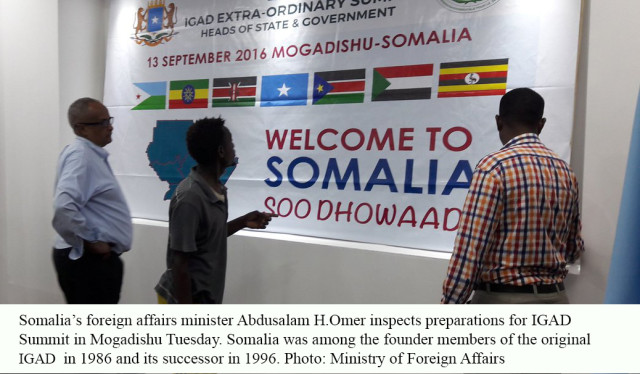IGAD Summit in Somalia: What you need to know about the bloc

The 53rd IGAD extra-ordinary Heads of States and Governments Summit will be held in Somalia’s capital Mogadishu Tuesday, the first since the bloc was re-established in 1996.
The Intergovernmental Authority on Development in 1996 superseded the Intergovernmental Authority on Drought and Development that was founded in 1986 to deal with issues related to drought and desertification in the Horn Africa.
The revitalised IGAD, with expanded areas of regional cooperation and a new organisational structure, was launched by the IGAD Assembly of Heads of State and Government on 25 November 1996 in Djibouti, the Republic of Djibouti.
The bloc consists of eight member states categorized into three major regions. The Horn of Africa group consists of Somalia, Ethiopia, Djibouti and Eritrea. Nile Valley group is made up of Sudan and South Sudan while Kenya and Uganda form the Great Lakes group.
Somalia was among the founding members in 1986 which include Sudan, Kenya, Uganda, Djibouti and Ethiopia.
Eritrea joined in 1993 while South Sudan became a member immediately after its independence in 2011. Djibouti hosts the bloc’s headquarters.
Based on UN Conference on Trade and Development (UNCTAD) 2014 statistics, IGAD has a combined Gross Domestic Product of $218.2 billion and a GDP per capita of $874. The bloc occupies 5.5 million square kilometres with a total population of 247.4 million.
IGAD is composed of four hierarchical policy organs namely Assembly of Heads of State and Government, Council of Ministers, Committee of Ambassadors and the Secretariat.
Its objectives include promotion of joint policies on trade, communications, security, agriculture, free movement of people and goods among others.
In the recent past security has emerged as a sticking concern for the bloc with Somalia, Burundi and South Sudan topic the list of IGAD meetings.
IGAD proposed in August this year the deployment of foreign troops to South Sudan’s capital, Juba following the outbreak of clashes in the bloc’s newest member. The UN approved the proposal and has since Okayed the deployment of 4,000 troops.
In 2006, the African Union Peace and Security Council approved an IGAD proposal to deploy an IGAD Peace and Support Mission in Somalia (IGASOM). A year later in February 21, 2007, the UN Security Council approved Resolution 1744 which authorized the deployment of a new African Union Mission to Somalia (AMISOM) to replace IGASOM.
Kenya’s Mohamed Abdi Affey was appointed in December 15, 2013 as IGAD special envoy to Somalia.
IGAD council of Ministers met in Mogadishu in January 2015.
IGAD is currently involved in the Hiiraan/Middle Shabelle state formation process in Somalia.